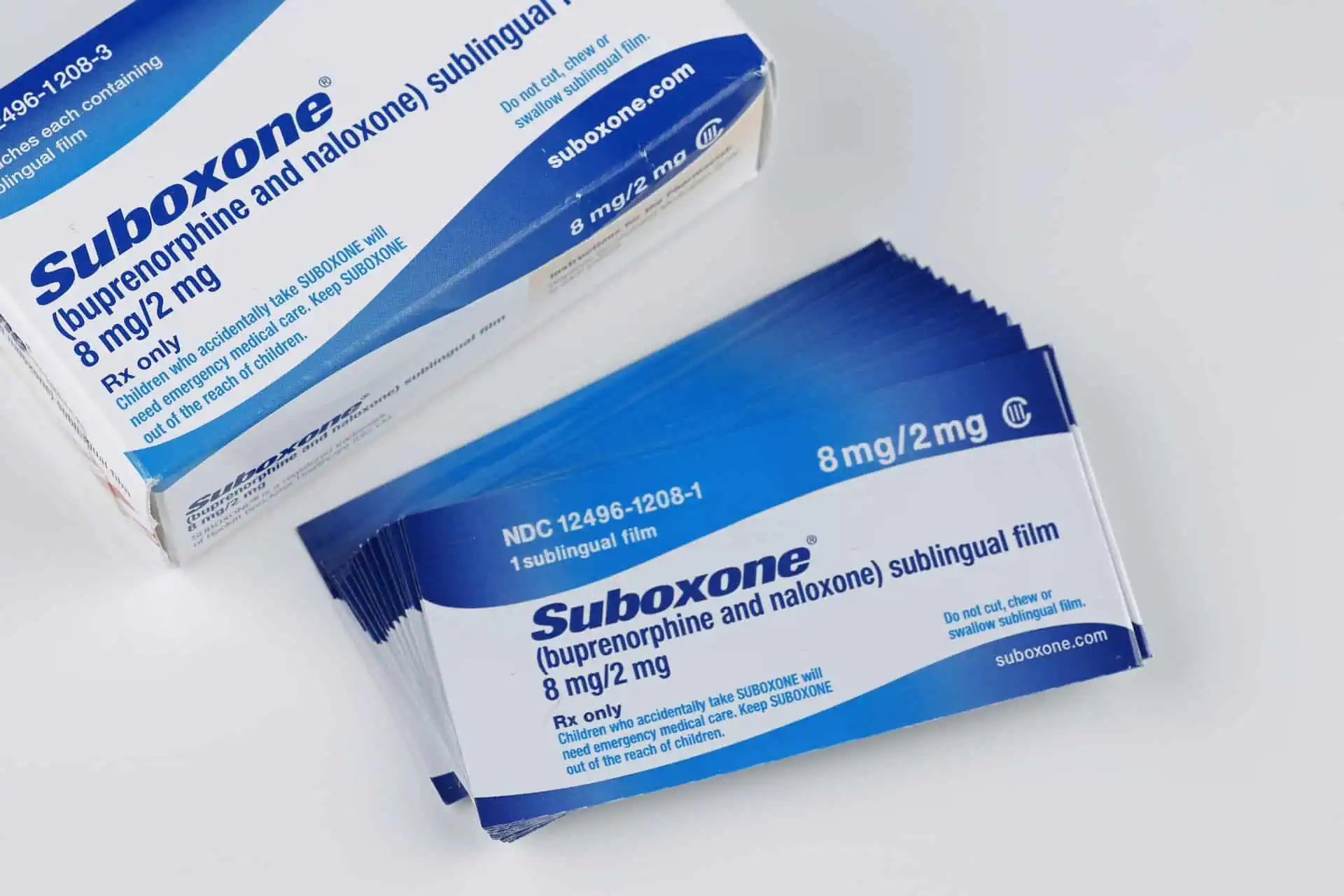FAQ: Who Qualifies for the Suboxone Dental Lawsuit?
- Last Updated: June 12th, 2025

Attorney Jessica Paluch-Hoerman, founder of TruLaw, has over 28 years of experience as a personal injury and mass tort attorney, and previously worked as an international tax attorney at Deloitte. Jessie collaborates with attorneys nationwide — enabling her to share reliable, up-to-date legal information with our readers.
Legally Reviewed
This article has been written and reviewed for legal accuracy and clarity by the team of writers and legal experts at TruLaw and is as accurate as possible. This content should not be taken as legal advice from an attorney. If you would like to learn more about our owner and experienced injury lawyer, Jessie Paluch, you can do so here.
Fact-Checked
TruLaw does everything possible to make sure the information in this article is up to date and accurate. If you need specific legal advice about your case, contact us by using the chat on the bottom of this page. This article should not be taken as advice from an attorney.
FAQ: Who Qualifies For The Suboxone Dental Lawsuit? Let's Discuss.
Question: Who qualifies for the Suboxone Dental Lawsuit?
Answer: To qualify for the Suboxone Dental Lawsuit, individuals must have used Suboxone sublingual films as directed for opioid dependence prior to 2022 and experienced severe dental issues.
On this page, we’ll discuss this question in further depth, an overview of the Suboxone Dental lawsuit, dental health risks associated with Suboxone, and much more.
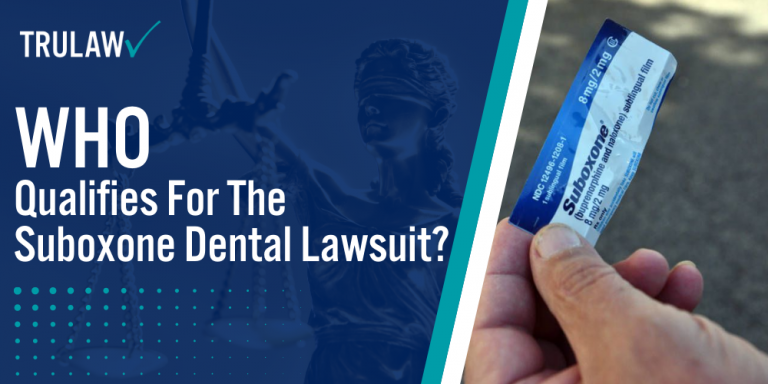
Intro to the Suboxone Dental Lawsuits
Suboxone sublingual film received an FDA-mandated warning label in 2022 regarding potential dental risks.
You may qualify to seek compensation in the Suboxone dental lawsuit if you’ve experienced the following:
- Severe tooth decay requiring multiple fillings or procedures
- Worsening dental health despite consistent oral hygiene
- Painful dental complications (abscesses, infections)
- Significant cosmetic or functional damage to teeth
- Other oral dental issues
Use the chat on this page for an instant case evaluation to find out if you qualify to join others filing Suboxone Dental Lawsuits.
Table of Contents
Dental Risks Associated with Suboxone
While Suboxone is used in the treatment of opioid use disorder, it carries risks, including potential dental harm; understanding these dangers is critical for users considering its long-term impact.
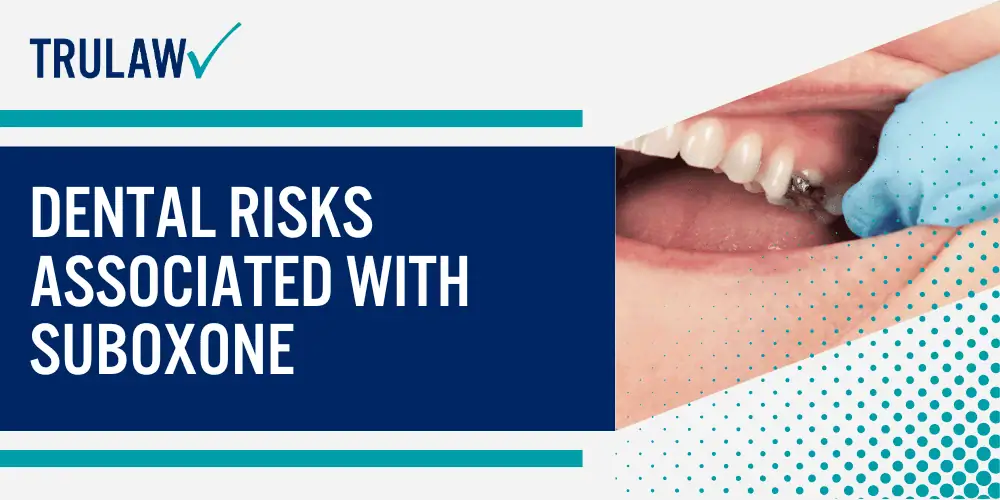
Risk of Dental Injuries
Taking Suboxone can lead to serious dental injuries.
Problems like tooth decay, oral infections, and even loss of teeth may happen.
These issues are not just uncomfortable but often require expensive treatments such as cavity filling, root canals, or implants.
Some people have had cracked teeth or needed crowns replaced because of the damage caused by Suboxone.
Suboxone’s side effects impact dental health severely.
Its users might notice weakened tooth enamel which leaves teeth vulnerable to decay and breakage.
Regular dental care is crucial for anyone on this medication.
This care includes using fluoride products and keeping a healthy diet rich in calcium and vitamin D.
Dental injuries from Suboxone could be grounds for legal action if patients were not warned about these risks.
Side Effects Associated With Suboxone
Suboxone helps many people fight opioid addiction.
But, it can also lead to dental problems and other side effects.
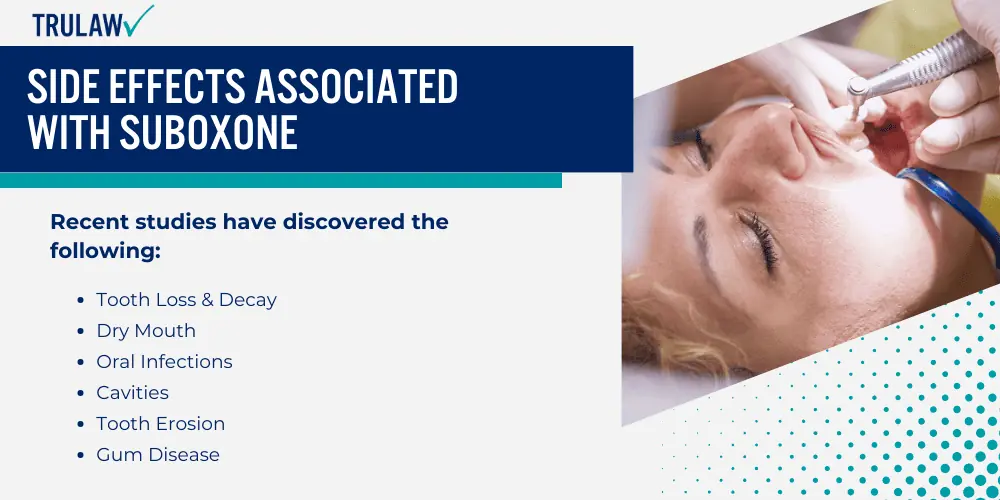
Recent studies have discovered the following oral health conditions have been linked to Suboxone including, but are not limited to:
1. Tooth Loss & Decay
One of the more alarming side effects reported by Suboxone users is severe tooth decay.
This can escalate to tooth loss if not managed properly.
The medication’s formulation, particularly its acidity, is thought to contribute to this problem.
When the acidic substance comes in contact with the teeth, it can lead to erosion of the enamel, the hard, protective outer layer of the teeth.
Over time, this erosion can lead to decay, cavities, and eventually, tooth loss.
2. Dry Mouth
Dry mouth is a common side effect experienced by those taking Suboxone.
Saliva plays a vital role in maintaining oral health, washing away food particles, and neutralizing acids produced by bacteria in the mouth.
A reduction in saliva can therefore increase the risk of cavities, as there’s less natural cleansing and balancing occurring in the mouth.
3. Oral Infections
Some patients on Suboxone have reported developing oral infections.
These infections can manifest as gum disease (gingivitis or periodontitis), thrush, or other types of oral lesions.
Such conditions not only cause discomfort but can also lead to more serious health issues if left untreated.
4. Cavities
An increase in cavities is another potential side effect for those taking Suboxone.
Cavities, or dental caries, occur when the enamel of the tooth is broken down by acids produced by bacteria in the mouth.
The reduced saliva flow and potential changes in oral pH due to Suboxone use can create an environment more conducive to cavity formation.
5. Tooth Erosion
The film form of Suboxone, which is placed under the tongue, can contribute to tooth erosion.
This form of the drug comes into direct contact with the teeth, and its acidic nature can wear down the enamel over time.
This erosion not only makes teeth more susceptible to decay but can also lead to sensitivity and discomfort.
6. Gum Disease
Long-term use of Suboxone can increase the risk of developing gum disease.
Symptoms of gum disease include swollen, red, and bleeding gums.
In more advanced stages, it can lead to the breakdown of the bone and tissue that support the teeth, potentially leading to tooth loss.
Links Discovered Between Suboxone and Tooth Decay
Suboxone’s potential to cause tooth decay has emerged as a significant concern, prompting patients to scrutinize the medication’s effects on dental health—details of this alarming connection await those seeking clarity and legal recourse.
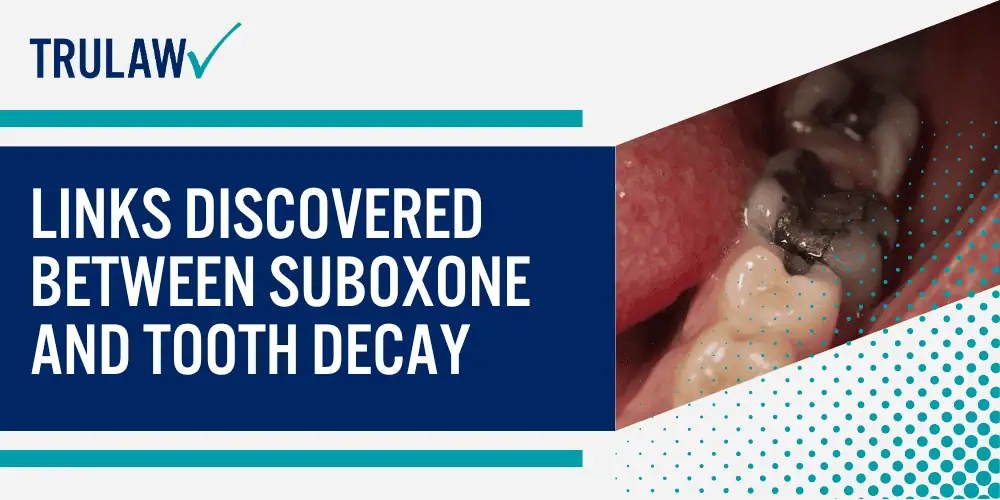
Patient Reports of Suboxone-Related Dental and Oral Injuries
Many people have reported serious dental issues after using Suboxone.
They talk about tooth decay, cavities, and even losing teeth. Dentists see lots of cracked teeth and infections in patients who take this drug.
Some folks need root canals or crowns because their teeth get so bad.
A man from Ohio shared his story about getting hurt by Suboxone film.
He had to deal with painful dental problems that cost him a lot of money to fix.
Stories like his are why there is a big court case against the makers of Suboxone.
They’re trying to help others who went through similar troubles get paid back for their suffering and medical bills.
Suboxone’s Acidic Nature Causes Dental Damage
Suboxone may weaken tooth enamel because it’s acidic.
This medicine treats opioid addiction but can hurt your teeth.
Acids in Suboxone eat away at the hard, outer layer of your teeth.
Over time, this damage leads to decay and other serious dental issues.
Taking Suboxone often might cause cavities or infections.
Your risk goes up if you take it for a long time.
People who have had these problems are now filing lawsuits.
They say they weren’t warned about the risks to their teeth from Suboxone’s acidity.
Dry Mouth Side Effect of Suboxone
Dry mouth isn’t just uncomfortable; it can lead to serious dental problems.
It’s one of the side effects linked to Suboxone, a drug used to treat opioid dependence.
This condition reduces saliva in your mouth, which normally protects teeth.
Without enough saliva, tooth decay and other dental injuries can happen more easily.
Many people don’t realize that dry mouth from Suboxone could harm their oral health until damage occurs.
Those who have suffered severe dry mouth are now finding they may be eligible for compensation through lawsuits.
If you’ve faced this issue after using Suboxone, legal options might be available for you to seek damages for medical expenses and pain endured due to this side effect.
Legal Aspects of Suboxone Dental Lawsuit
The legal framework surrounding Suboxone dental lawsuits hinges on allegations that manufacturers failed to adequately warn of the risks of tooth decay associated with the drug.
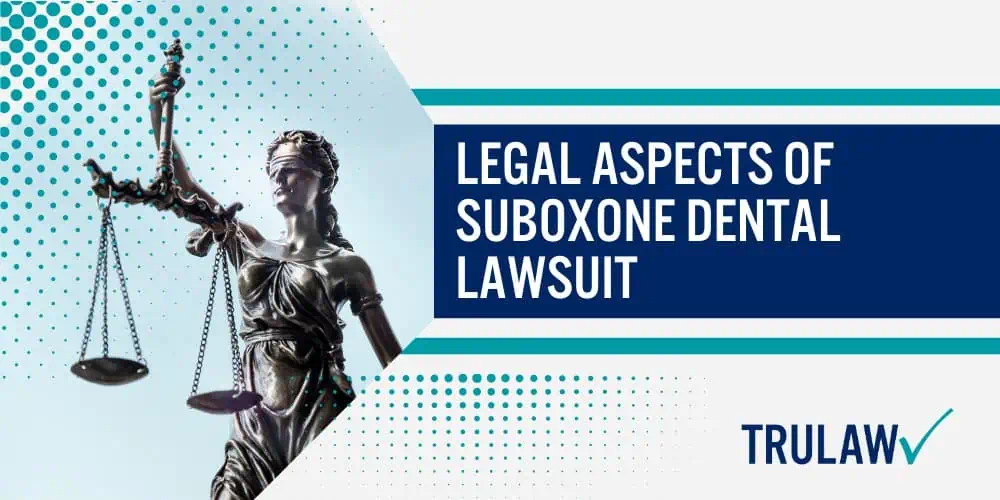
Claimants argue this lack of information led to severe dental issues, prompting litigation for compensation.
Why Are People Filing Suboxone Lawsuits?
People are filing Suboxone lawsuits because they suffered dental problems after using the drug.
They claim that Indivior, the maker of Suboxone, did not warn them about these risks.
Many individuals experience tooth decay, cavities, and even loss of teeth due to Suboxone use.
These lawsuits aim to get compensation for injury victims who faced expensive dental treatments or endured pain and suffering.
Lawyers say Indivior should have told patients about the possibility of severe tooth decay from taking Suboxone.
Patients trusted this medication to help treat their opioid addiction but ended up with more health issues instead.
Now, they are taking legal action against the company for product liability and failure to warn about potential side effects related to dental health.
The Core of Every Suboxone Lawsuit – Failure to Warn
Suboxone lawsuits center on a key issue: the manufacturer’s failure to warn about dental risks.
Patients taking Suboxone for opioid addiction treatment suffered severe tooth decay, but claim they weren’t told this could happen.
Drug manufacturers must inform users about potential side effects.
In these cases, patients argue that Indivior did not fulfill that responsibility.
Lawyers say warnings about tooth decay and other dental problems should have been clearer.
Because of this lack of information, people are seeking compensation through litigation.
They believe better warnings could have prevented their dental injuries or at least allowed them to make informed decisions about their opioid addiction treatment.
Who Qualifies for a Suboxone Lawsuit in 2024?
Eligibility for the Suboxone dental lawsuit in 2024 hinges on demonstrable harm; individuals who used Suboxone as prescribed and subsequently suffered severe dental decay may qualify to join this legal challenge.
Suboxone Tooth Decay Lawsuit Eligibility
If you’ve suffered dental problems after taking Suboxone, you might qualify for a lawsuit.
Here are key factors to determine your eligibility:
- Experienced tooth decay or other dental issues while on Suboxone.
- You began noticing these dental problems during or after treatment with Suboxone.
- There’s evidence to link your dental injuries directly to Suboxone use.
- Your dental issues require treatment such as fillings, root canals, or extractions.
- You took the drug as prescribed by a healthcare professional.
- The statute of limitations hasn’t run out on your case yet. Check your state’s laws for specific timelines.
How to Join the Suboxone Tooth Decay Lawsuit
Joining a Suboxone tooth decay lawsuit is straightforward.
You need to prove that you used Suboxone and suffered dental issues as a result.
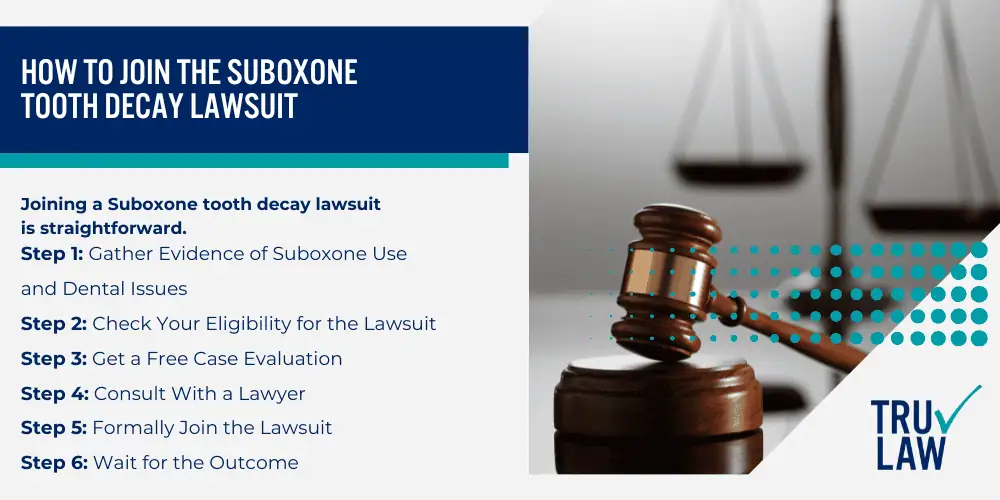
Step 1: Gather Evidence of Suboxone Use and Dental Issues
To build a strong case, you need to meticulously document your Suboxone usage and any dental problems you have experienced.
Here’s what you should do:
- Collect Medical Records: Begin by gathering all relevant documents that prove you were prescribed Suboxone. This includes your prescription records, doctor’s notes, and pharmacy records. These documents will serve as essential evidence of your Suboxone usage.
- List Dental Treatments: Create a comprehensive list of all dental treatments you have undergone since starting Suboxone. Include dates, the types of treatments, and the names of the dental clinics or dentists who provided them.
- Write Down Symptoms and Issues: Maintain a detailed record of any dental problems you’ve experienced after beginning Suboxone treatment. Note the onset of symptoms, how they have progressed, and how they have affected your daily life.
- Detail-Specific Dental Injuries: If you have suffered from tooth decay or other dental injuries, ensure you provide detailed descriptions, including dates and the severity of the issues.
Step 2: Check Your Eligibility for the Lawsuit
Understanding whether you meet the eligibility criteria for the lawsuit is crucial.
Here’s what you should do:
- Familiarize yourself with the specific requirements for joining the lawsuit. These may include proof of Suboxone use and evidence of dental damage.
- Compare your situation to the lawsuit criteria. Ensure that your medical and dental records strongly support your claim of Suboxone-related dental issues.
Step 3: Get a Free Case Evaluation
To evaluate the strength of your case, it’s advisable to seek a free case evaluation.
Here’s how to proceed:
- Visit the TruLaw website and complete the provided form to request a free evaluation of your case.
- Share all the evidence and documentation you have collected with TruLaw. The more detailed your information, the better they can assess the viability of your case.
Step 4: Consult With a Lawyer
If your case seems promising after the initial evaluation, it’s time to consult with a lawyer.
Seek out lawyers who specialize in cases related to Suboxone-induced dental problems.
They possess the expertise and knowledge necessary to guide you through the legal process.
Engage in a thorough discussion about the lawsuit with your chosen attorney.
Inquire about the potential for compensation, the process of joining the lawsuit, and the expected timeline for resolution.
Step 5: Formally Join the Lawsuit
Once you’ve decided to proceed, your lawyer will assist you in officially joining the class-action lawsuit.
Your attorney will help you complete all the required paperwork to join the lawsuit.
This will include filling out forms and providing any additional evidence needed to support your case.
Your lawyer will walk you through each step of the legal process, from filing your claim to potential court appearances.
They will ensure you are well-prepared for what lies ahead.
Step 6: Wait for the Outcome
It’s important to remember that lawsuits can be lengthy and may take months or even years to resolve.
During this waiting period be prepared for a potentially protracted legal battle, and understand that patience is crucial throughout the process.
Maintain regular contact with your attorney to stay updated on the status of the lawsuit and to receive any advice or actions you may need to take.
Potential Damages in a Suboxone Tooth Decay Lawsuit
Victims of Suboxone-related tooth decay may seek substantial compensation for their injuries and losses.
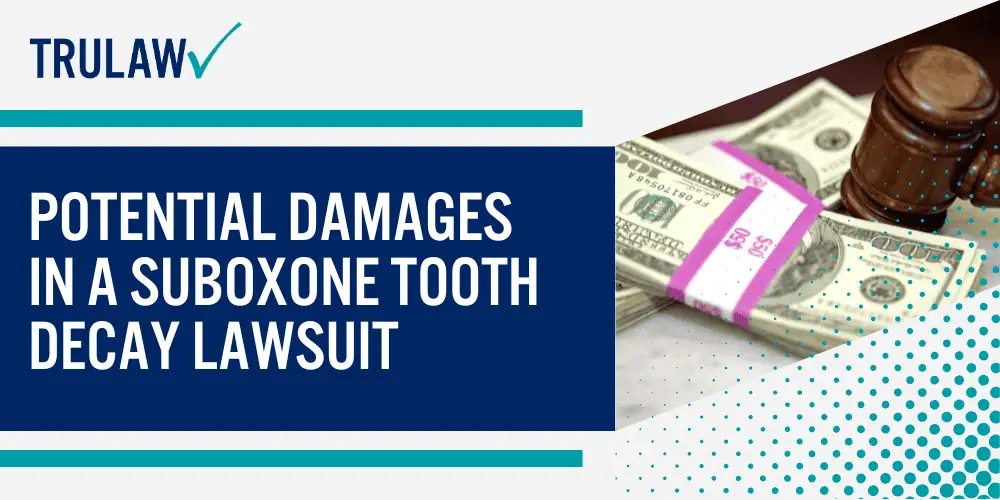
This includes covering both tangible and intangible damages incurred due to dental issues from prescribed Suboxone use.
Medical Expenses
If you had severe dental injuries from prescribed Suboxone film, you might have paid a lot for the dentist.
Treatments like fillings, crowns, root canals, or even full tooth extractions add up quickly.
Many people face huge bills after fixing damage Suboxone caused to their teeth.
You could get money back for those bills through a Suboxone tooth decay lawsuit.
This includes past dental treatments and any future ones you might need.
Suboxone lawsuits are paying out to cover these costs because the drug did not warn users about tooth decay risks properly.
If your teeth were harmed by Suboxone tablets or film, legal action could help pay for your medical expenses.
Pain and Suffering
Victims of Suboxone dental damage often face more than just physical pain; their emotional distress can be overwhelming.
Patients may experience intense discomfort, difficulty eating, and embarrassment from tooth loss or decay.
These personal hardships are critical in a Suboxone lawsuit, as they hold immense value.
Living with severe tooth decay or other dental problems is hard.
It affects your day-to-day life and your self-esteem.
This type of suffering deserves compensation because it goes beyond the immediate medical bills—it impacts your overall quality of life.
That’s why claims for pain and suffering play a major part in these lawsuits.
Lost Wages
If you had severe tooth decay due to Suboxone and missed work for treatment, you might claim lost wages.
This means that if dentist visits, recovery from dental surgeries, or time spent on managing pain kept you from your job, these are part of the damages.
Suboxone tooth decay lawsuits consider the money you did not earn because of your dental issues.
In a lawsuit, proving lost income is important.
Bring pay stubs, employment records, and statements from your boss to show exactly how much work was missed.
The goal is to get back what you would have earned without the injury caused by Suboxone.
Future Medical Costs
People who take Suboxone and suffer teeth damage might face more medical bills down the road.
These costs can include regular dentist visits, fixing or replacing bad teeth, and treatments for any mouth infections.
Some patients need procedures like root canals or dental implants which are expensive.
If you join a lawsuit because Suboxone hurt your teeth, you may get money to help with these future doctor’s bills.
Having a tooth fixed is not just costly; it takes time and might cause discomfort too.
Taking part in a Suboxone tooth decay lawsuit could give you financial support for all this.
You won’t have to worry about paying for dental work years after taking the drug.
Money from a legal win pays for check-ups and fixes that keep your smile healthy long-term.
The #1 Suboxone Lawyer: TruLaw
TruLaw is a leader in handling product liability cases, offering unmatched expertise in personal injury representation.
Our extensive network of legal professionals excels in pharmaceutical litigations such as the ongoing Suboxone litigations.
If you or a loved one suffered severe tooth decay, worsening dental health, or dental injuries after taking Suboxone, you may be eligible to file a Suboxone Lawsuit.
Use the chatbot on this page for a free and instant case evaluation to find out if you qualify to join others filing Suboxone Lawsuits.
Suboxone Lawsuit Frequently Asked Questions
-
How can individuals with opioid use disorder who have experienced dental issues from Suboxone seek legal help?
Individuals suffering from opioid use disorder who have experienced dental issues due to Suboxone can seek legal assistance from specialized Suboxone lawyers.
These attorneys are experienced in handling suboxone teeth lawsuits and can guide how to file a suboxone tooth decay claim.
-
What legal options are available for those affected by tooth decay after using Suboxone?
Affected individuals can participate in a suboxone class action lawsuit or pursue individual suboxone tooth decay litigation.
Experienced suboxone tooth decay lawyers can offer legal counsel and help clients understand their rights and options for seeking a suboxone settlement.
-
Are withdrawal symptoms from Suboxone considered in tooth decay lawsuits?
While withdrawal symptoms from Suboxone are a separate health concern, they are generally not the focus of Suboxone tooth decay litigation.
These lawsuits concentrate on the dental injuries allegedly caused by the medication.
-
What is the role of the Northern District of Ohio in Suboxone litigation?
The Northern District of Ohio has been a pivotal jurisdiction in the suboxone tooth decay litigation, particularly in cases that have influenced nationwide discussions and decisions regarding suboxone settlements.
-
How can I join a Suboxone tooth decay class action lawsuit?
To join a suboxone class action lawsuit, you should contact a qualified suboxone lawyer who can assess your case and determine your eligibility.
They can guide you through the process of filing a suboxone tooth decay claim and represent you in seeking compensation.

Managing Attorney & Owner
With over 25 years of legal experience, Jessica Paluch-Hoerman is an Illinois lawyer, a CPA, and a mother of three. She spent the first decade of her career working as an international tax attorney at Deloitte.
In 2009, Jessie co-founded her own law firm with her husband – which has scaled to over 30 employees since its conception.
In 2016, Jessie founded TruLaw, which allows her to collaborate with attorneys and legal experts across the United States on a daily basis. This hypervaluable network of experts is what enables her to share the most reliable, accurate, and up-to-date legal information with our readers!
Additional Suboxone Lawsuit resources on our website:
Here, at TruLaw, we’re committed to helping victims get the justice they deserve.
Alongside our partner law firms, we have successfully collected over $3 Billion in verdicts and settlements on behalf of injured individuals.
Would you like our help?
At TruLaw, we fiercely combat corporations that endanger individuals’ well-being. If you’ve suffered injuries and believe these well-funded entities should be held accountable, we’re here for you.
With TruLaw, you gain access to successful and seasoned lawyers who maximize your chances of success. Our lawyers invest in you—they do not receive a dime until your lawsuit reaches a successful resolution!
AFFF Lawsuit claims are being filed against manufacturers of aqueous film-forming foam (AFFF), commonly used in firefighting.
Claims allege that companies such as 3M, DuPont, and Tyco Fire Products failed to adequately warn users about the potential dangers of AFFF exposure — including increased risks of various cancers and diseases.
Depo Provera Lawsuit claims are being filed by individuals who allege they developed meningioma (a type of brain tumor) after receiving Depo-Provera birth control injections.
A 2024 study found that women using Depo-Provera for at least 1 year are five times more likely to develop meningioma brain tumors compared to those not using the drug.
Suboxone Tooth Decay Lawsuit claims are being filed against Indivior, the manufacturer of Suboxone, a medication used to treat opioid addiction.
Claims allege that Indivior failed to adequately warn users about the potential dangers of severe tooth decay and dental injuries associated with Suboxone’s sublingual film version.
Social Media Harm Lawsuits are being filed against social media companies for allegedly causing mental health issues in children and teens.
Claims allege that companies like Meta, Google, ByteDance, and Snap designed addictive platforms that led to anxiety, depression, and other mental health issues without adequately warning users or parents.
Transvaginal Mesh Lawsuits are being filed against manufacturers of transvaginal mesh products used to treat pelvic organ prolapse (POP) and stress urinary incontinence (SUI).
Claims allege that companies like Ethicon, C.R. Bard, and Boston Scientific failed to adequately warn about potential dangers — including erosion, pain, and infection.
Bair Hugger Warming Blanket Lawsuits involve claims against 3M — alleging their surgical warming blankets caused severe infections and complications (particularly in hip and knee replacement surgeries).
Plaintiffs claim 3M failed to warn about potential risks — despite knowing about increased risk of deep joint infections since 2011.
Baby Formula NEC Lawsuit claims are being filed against manufacturers of cow’s milk-based baby formula products.
Claims allege that companies like Abbott Laboratories (Similac) and Mead Johnson & Company (Enfamil) failed to warn about the increased risk of necrotizing enterocolitis (NEC) in premature infants.
Here, at TruLaw, we’re committed to helping victims get the justice they deserve.
Alongside our partner law firms, we have successfully collected over $3 Billion in verdicts and settlements on behalf of injured individuals.
Would you like our help?
